
windows9x
It is windows, but all of the apps are ai generated.
Stars: 111
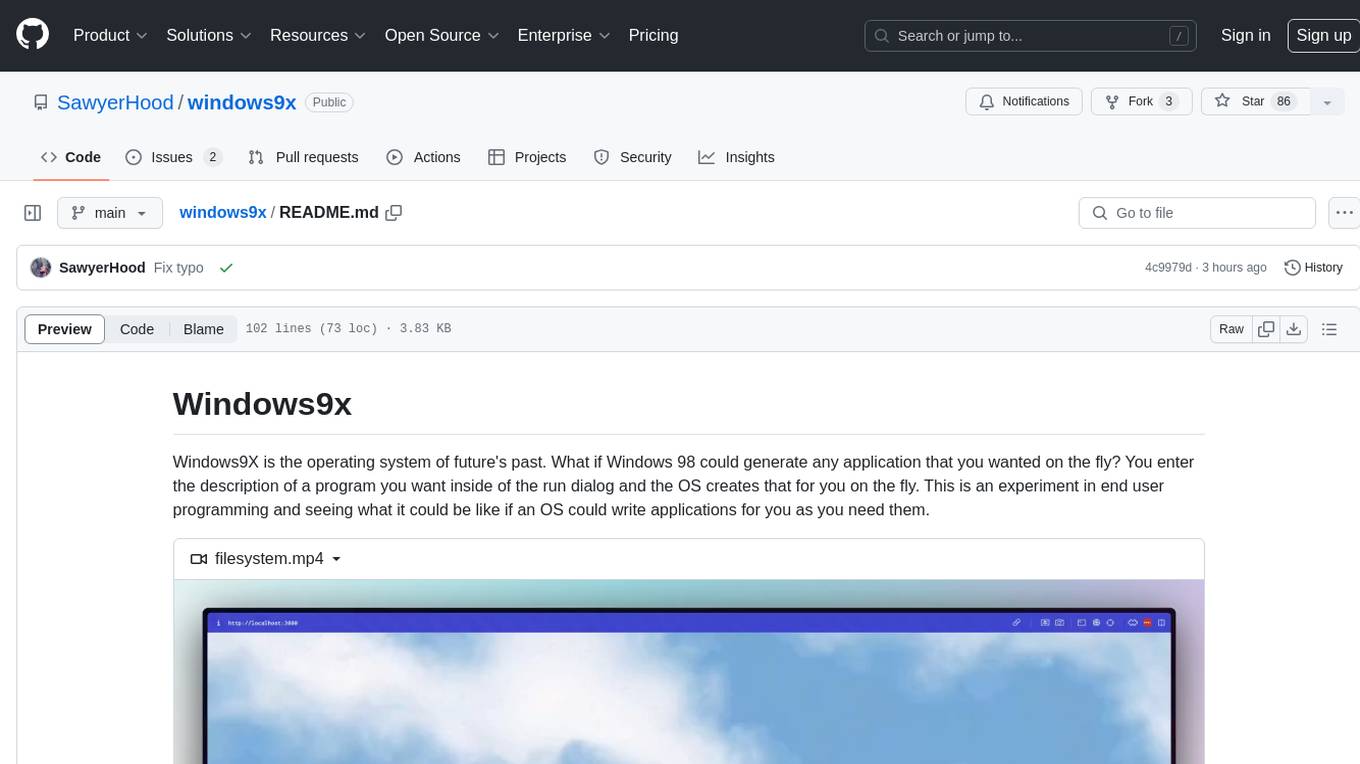
Windows9X is an experimental operating system that allows users to generate applications on the fly by entering descriptions of programs. It leverages an LLM to create HTML files resembling Windows 98 applications, with access to a limited OS API for file operations, registry interactions, and LLM prompting.
README:
Windows9X is the operating system of future's past. What if Windows 98 could generate any application that you wanted on the fly? You enter the description of a program you want inside of the run dialog and the OS creates that for you on the fly. This is an experiment in end user programming and seeing what it could be like if an OS could write applications for you as you need them.
https://github.com/SawyerHood/windows9x/assets/2380669/19c91f20-cdf5-47f9-b6fc-b7a606b9d7b3
Create a .env file with the following in the root directory:
ANTHROPIC_API_KEY=<your-anthropic-api-key>
NEXT_PUBLIC_LOCAL_MODE=true
# Optional Replicate API key for icon generation
REPLICATE_API_TOKEN=<your-replicate-api-token>
Note: NEXT_PUBLIC_LOCAL_MODE disables the use of 3rd party services other than your modal provider.
- Install node v21 or greater
- Install bun
- Run
bun install - Run
bun run dev - Navigate to
http://localhost:3000
When you enter a description of an application, an LLM is prompted to generate an HTML file that looks like a windows 98 application. This is done by injecting 98.css into the page as we stream in the result. This is rendered inside of an iframe that is rendered inside of a window.
In addition applications have access to a limited OS API that allows for saving/reading files, reading/writing from the registry, and prompting an LLM.
This is the api that applications have access to in case it helps with prompting:
declare global {
// Chat lets you use an LLM to generate a response.
var chat: (
messages: { role: "user" | "assistant" | "system"; content: string }[]
) => Promise<string>;
var registry: Registry;
// If the application supports saving and opening files, register a callback to be called when the user saves/opens the file.
// The format of the file is any plain text format that your application can read. If these are registered the OS will create
// the file picker for you. The operating system will create the file menu for you.
// The callback should return the new content of the file
// Used like this:
// registerOnSave(() => {
// return "new content";
// });
var registerOnSave: (callback: () => string) => void;
// Register a callback to be called when the user opens the file
// The callback should return the content of the file
// Used like this:
// registerOnOpen((content) => {
// console.log(content);
// });
var registerOnOpen: (callback: (content: string) => void) => void;
}
// Uses for the registry:
// - To store user settings
// - To store user data
// - To store user state
// - Interact with the operating system.
//
// If the key can be written by other apps, it should be prefixed with "public_"
interface Registry {
get(key: string): Promise<any>;
set(key: string, value: any): Promise<void>;
delete(key: string): Promise<void>;
listKeys(): Promise<string[]>;
}I want to thank the following people:
- Scratch - Inspired me by getting Windows 98 to run inside of a VM inside of Websim.
- Nate - Nate and I independently started building the same project. Nate gave me the idea of "chatting with the developer" to change the program.
- Jordan - Make 98.css which is the basis that makes this look like Windows 98.
Here are a few examples of applications that can be created:
Everything in Windows9X is a file you can generate a program to generate another program
https://github.com/SawyerHood/windows9x/assets/2380669/cb6f5189-9276-4526-a517-7d84b3331ba7
Here is an example of an application that is generated that in turn can generate websites.
https://github.com/SawyerHood/windows9x/assets/2380669/7a9a0a32-d52d-4901-8f33-d7e148e8bee3
Creating a natural language SQL prompter
https://github.com/SawyerHood/windows9x/assets/2380669/ab404aa7-7018-4d07-96b4-4678ca388d10
For Tasks:
Click tags to check more tools for each tasksFor Jobs:
Alternative AI tools for windows9x
Similar Open Source Tools

windows9x
Windows9X is an experimental operating system that allows users to generate applications on the fly by entering descriptions of programs. It leverages an LLM to create HTML files resembling Windows 98 applications, with access to a limited OS API for file operations, registry interactions, and LLM prompting.
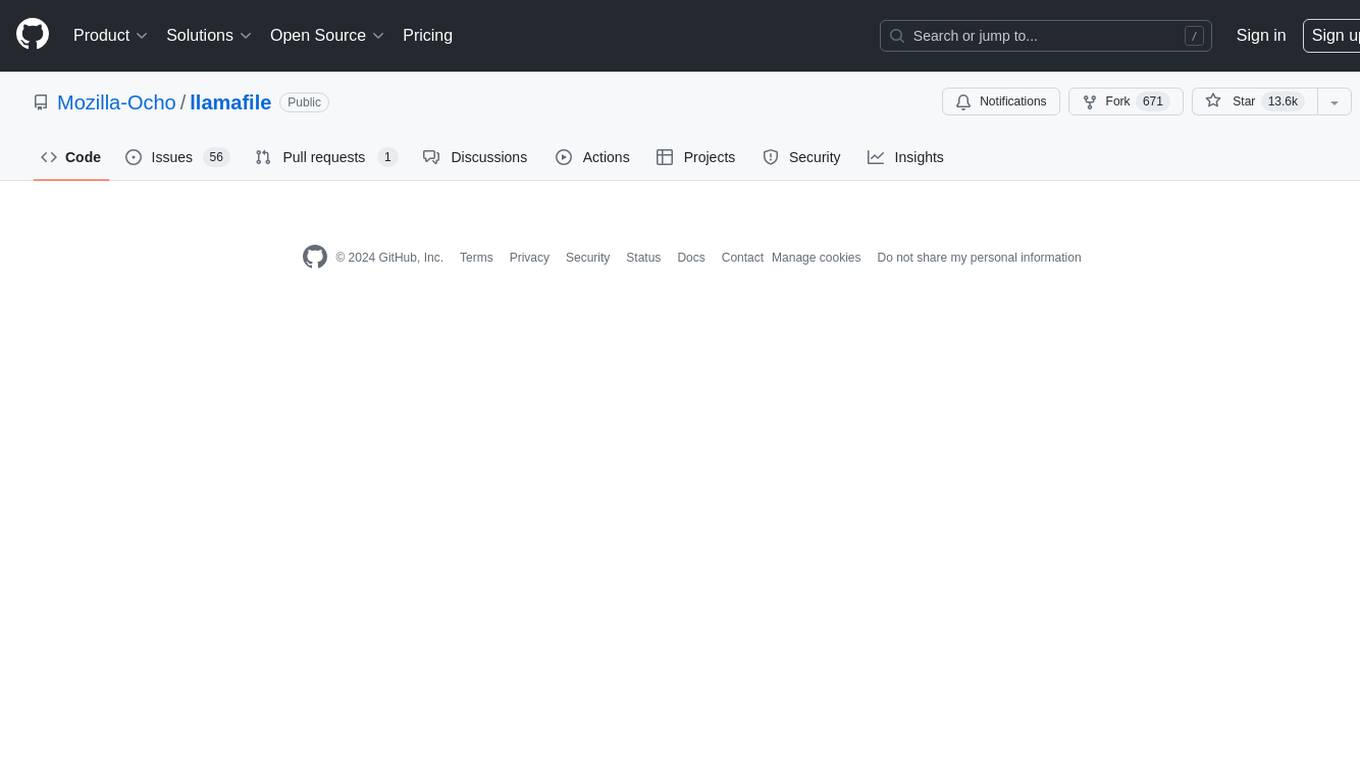
llamafile
llamafile is a tool that enables users to distribute and run Large Language Models (LLMs) with a single file. It combines llama.cpp with Cosmopolitan Libc to create a framework that simplifies the complexity of LLMs into a single-file executable called a 'llamafile'. Users can run these executable files locally on most computers without the need for installation, making open LLMs more accessible to developers and end users. llamafile also provides example llamafiles for various LLM models, allowing users to try out different LLMs locally. The tool supports multiple CPU microarchitectures, CPU architectures, and operating systems, making it versatile and easy to use.
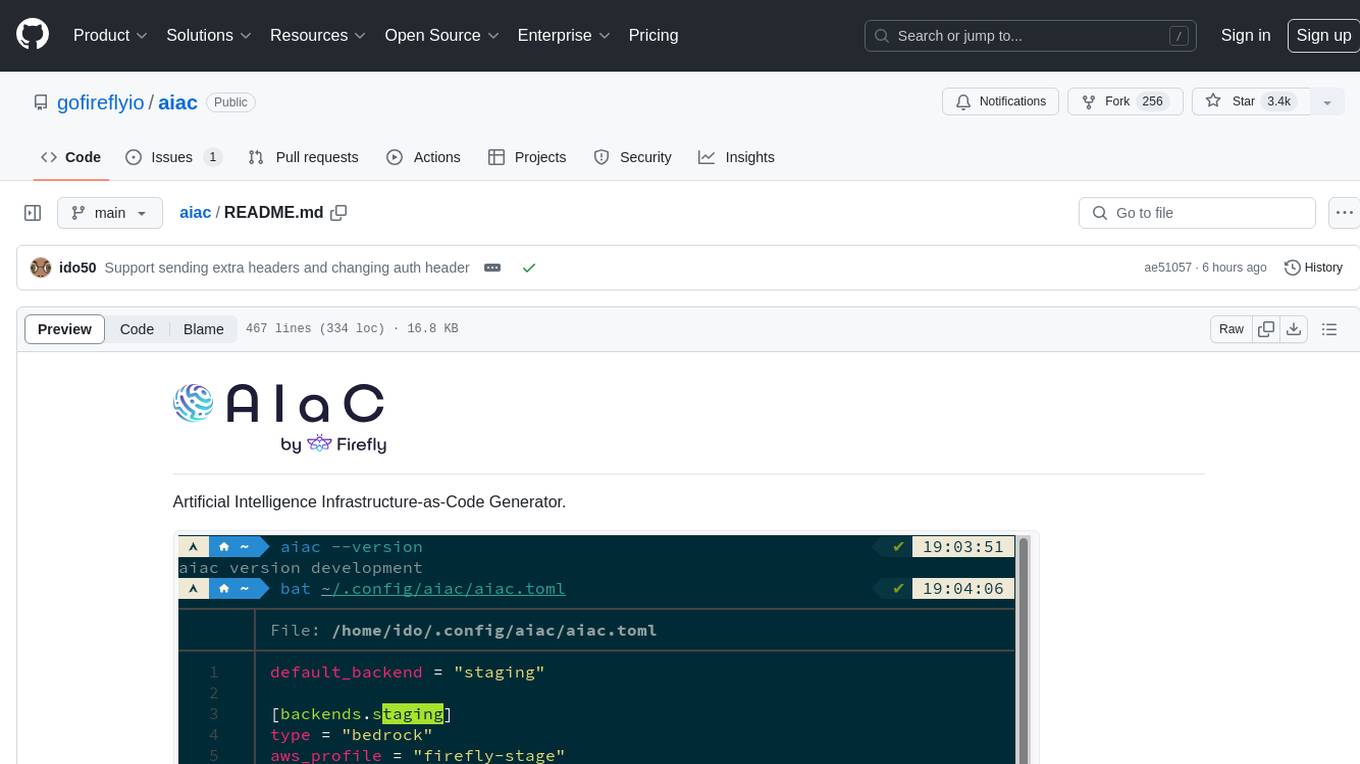
aiac
AIAC is a library and command line tool to generate Infrastructure as Code (IaC) templates, configurations, utilities, queries, and more via LLM providers such as OpenAI, Amazon Bedrock, and Ollama. Users can define multiple 'backends' targeting different LLM providers and environments using a simple configuration file. The tool allows users to ask a model to generate templates for different scenarios and composes an appropriate request to the selected provider, storing the resulting code to a file and/or printing it to standard output.
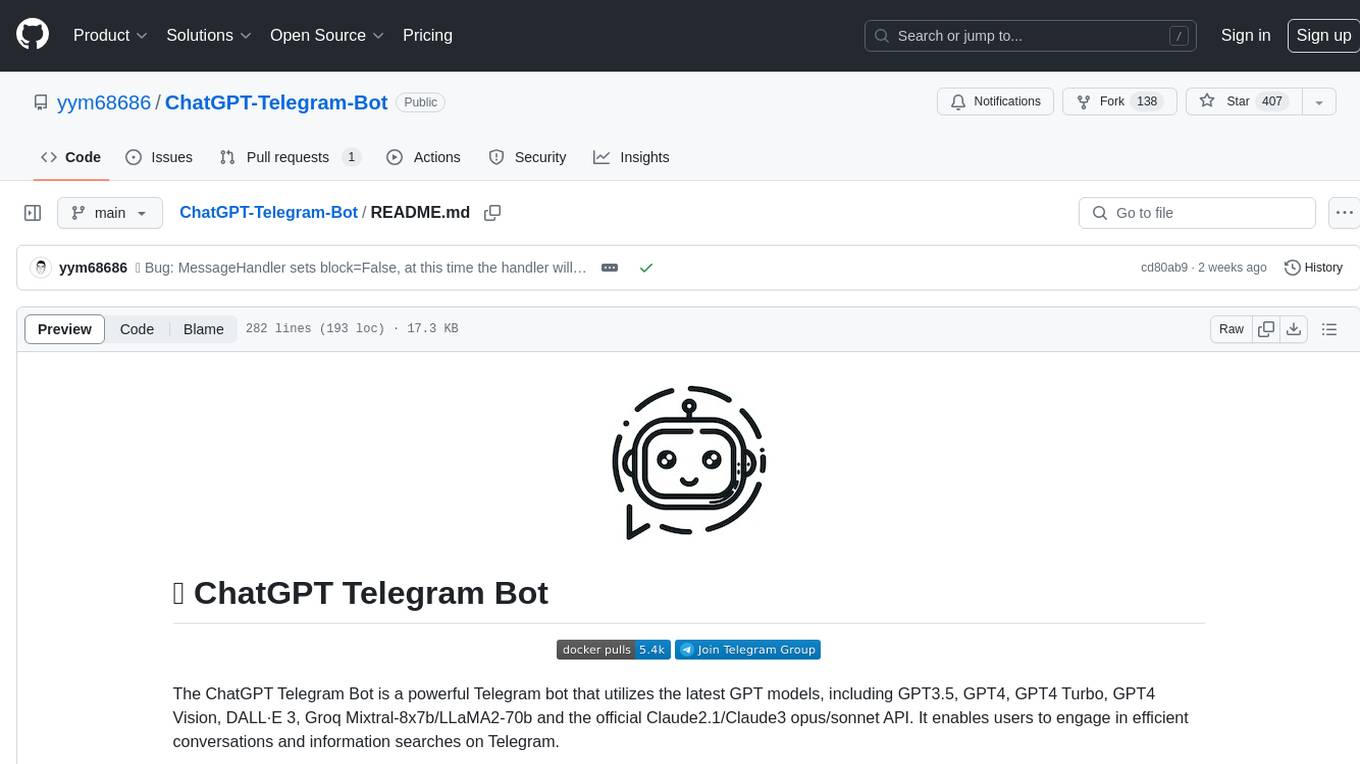
ChatGPT-Telegram-Bot
The ChatGPT Telegram Bot is a powerful Telegram bot that utilizes various GPT models, including GPT3.5, GPT4, GPT4 Turbo, GPT4 Vision, DALL·E 3, Groq Mixtral-8x7b/LLaMA2-70b, and Claude2.1/Claude3 opus/sonnet API. It enables users to engage in efficient conversations and information searches on Telegram. The bot supports multiple AI models, online search with DuckDuckGo and Google, user-friendly interface, efficient message processing, document interaction, Markdown rendering, and convenient deployment options like Zeabur, Replit, and Docker. Users can set environment variables for configuration and deployment. The bot also provides Q&A functionality, supports model switching, and can be deployed in group chats with whitelisting. The project is open source under GPLv3 license.
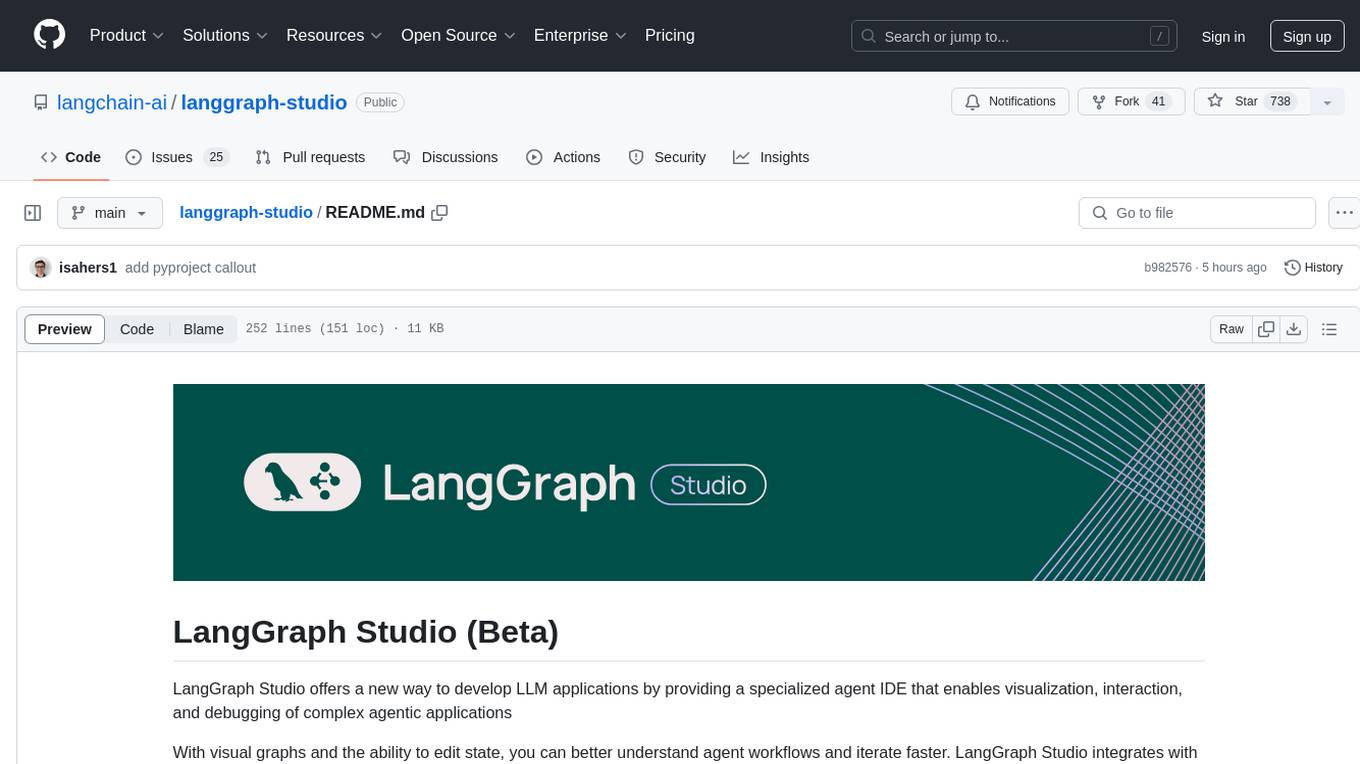
langgraph-studio
LangGraph Studio is a specialized agent IDE that enables visualization, interaction, and debugging of complex agentic applications. It offers visual graphs and state editing to better understand agent workflows and iterate faster. Users can collaborate with teammates using LangSmith to debug failure modes. The tool integrates with LangSmith and requires Docker installed. Users can create and edit threads, configure graph runs, add interrupts, and support human-in-the-loop workflows. LangGraph Studio allows interactive modification of project config and graph code, with live sync to the interactive graph for easier iteration on long-running agents.
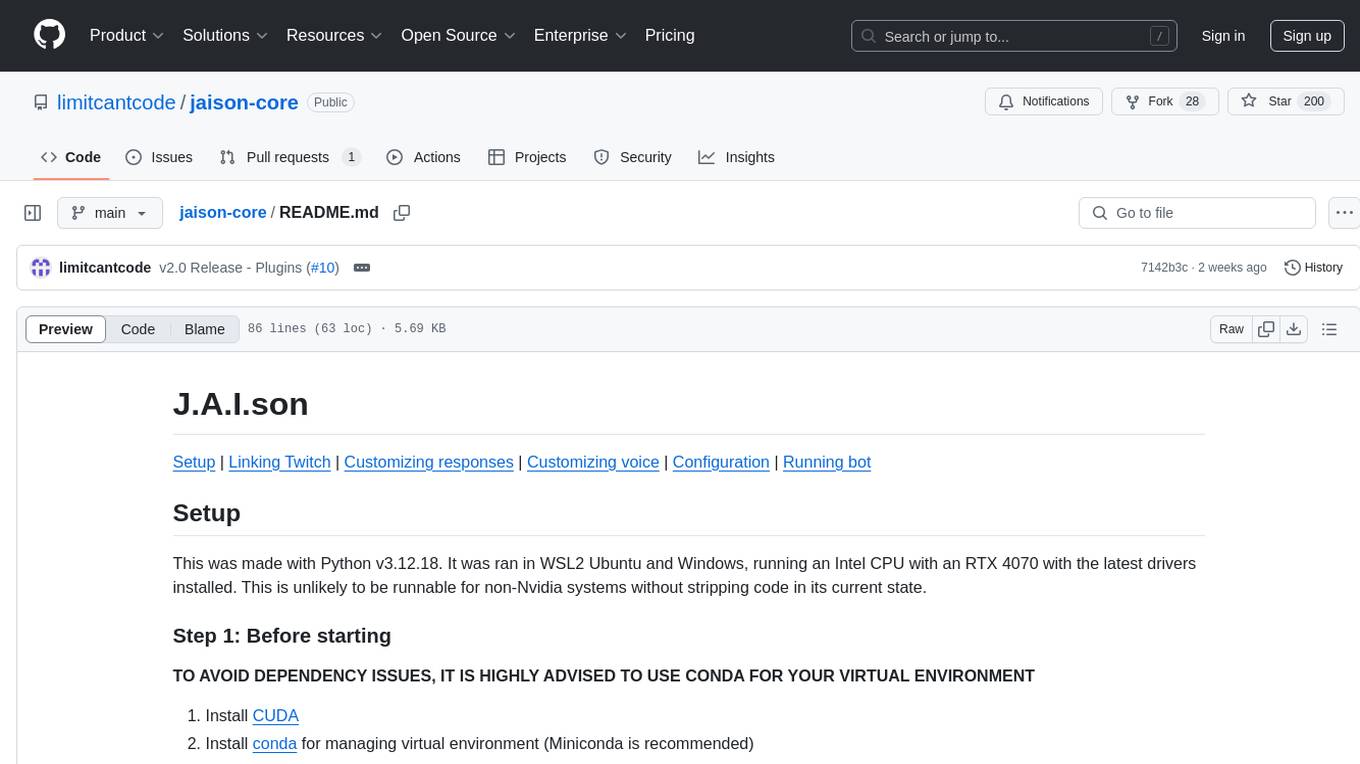
jaison-core
J.A.I.son is a Python project designed for generating responses using various components and applications. It requires specific plugins like STT, T2T, TTSG, and TTSC to function properly. Users can customize responses, voice, and configurations. The project provides a Discord bot, Twitch events and chat integration, and VTube Studio Animation Hotkeyer. It also offers features for managing conversation history, training AI models, and monitoring conversations.
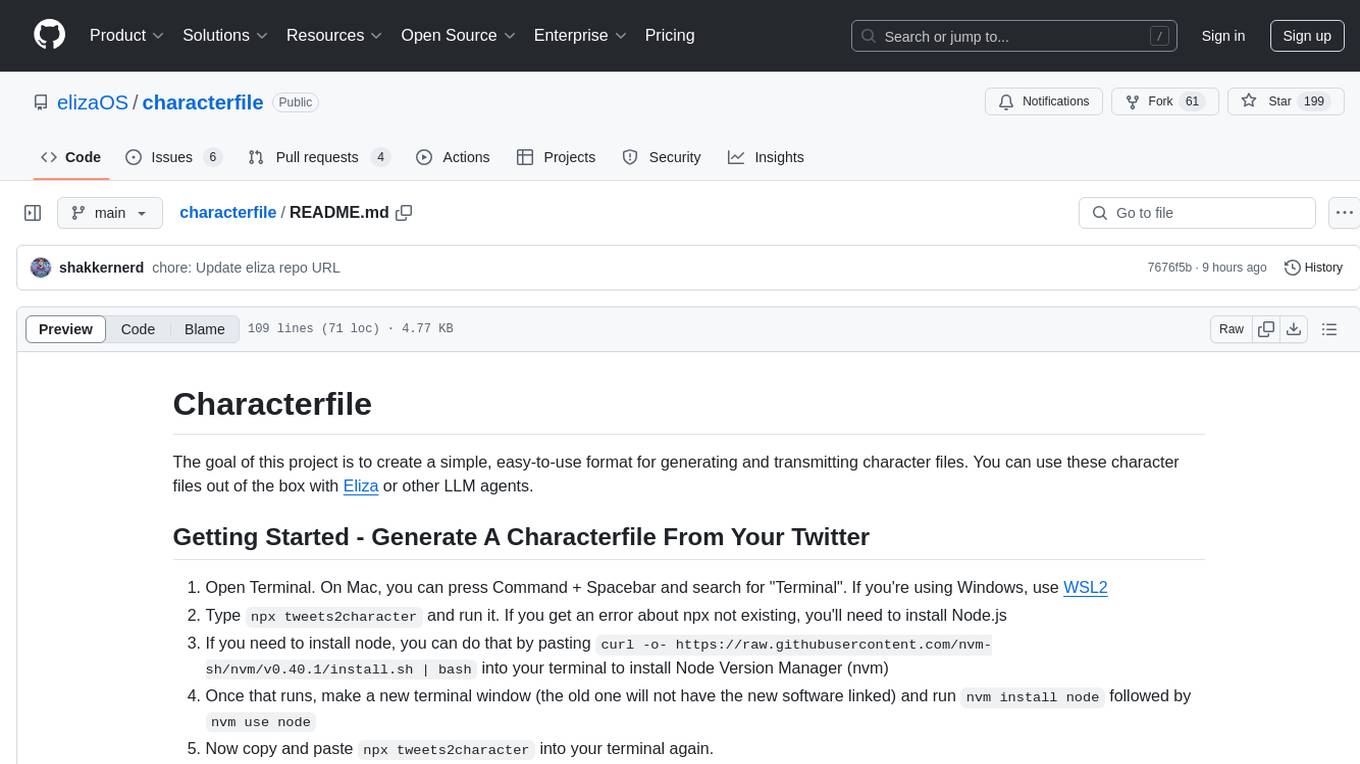
characterfile
The Characterfile project aims to create a simple format for generating and transmitting character files, compatible with Eliza and other LLM agents. Users can convert their Twitter archive into a character file using the provided scripts. The project also includes examples, JSON schema, and TypeScript types for the character file. Scripts like tweets2character, folder2knowledge, and knowledge2character facilitate the conversion of tweets, documents, and knowledge files into character files for use with AI agents.
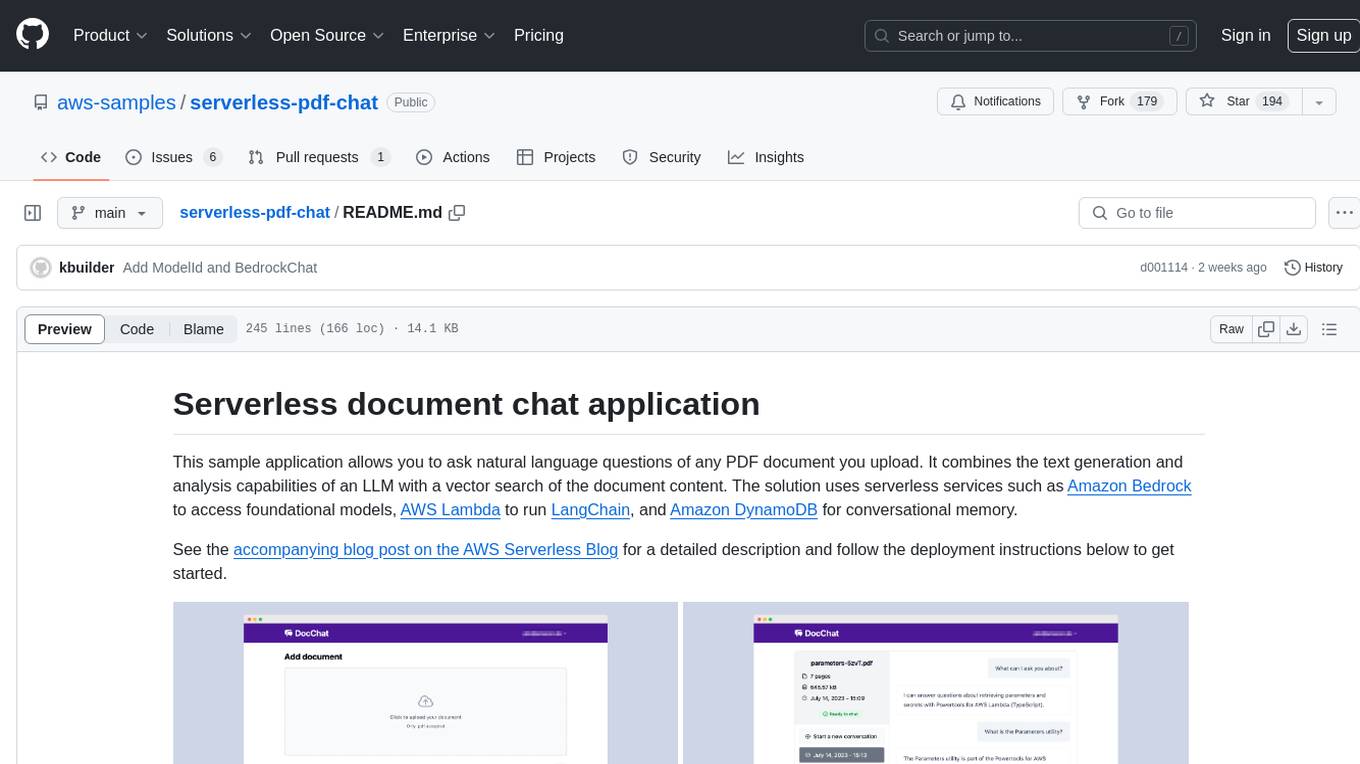
serverless-pdf-chat
The serverless-pdf-chat repository contains a sample application that allows users to ask natural language questions of any PDF document they upload. It leverages serverless services like Amazon Bedrock, AWS Lambda, and Amazon DynamoDB to provide text generation and analysis capabilities. The application architecture involves uploading a PDF document to an S3 bucket, extracting metadata, converting text to vectors, and using a LangChain to search for information related to user prompts. The application is not intended for production use and serves as a demonstration and educational tool.

gpt-subtrans
GPT-Subtrans is an open-source subtitle translator that utilizes large language models (LLMs) as translation services. It supports translation between any language pairs that the language model supports. Note that GPT-Subtrans requires an active internet connection, as subtitles are sent to the provider's servers for translation, and their privacy policy applies.
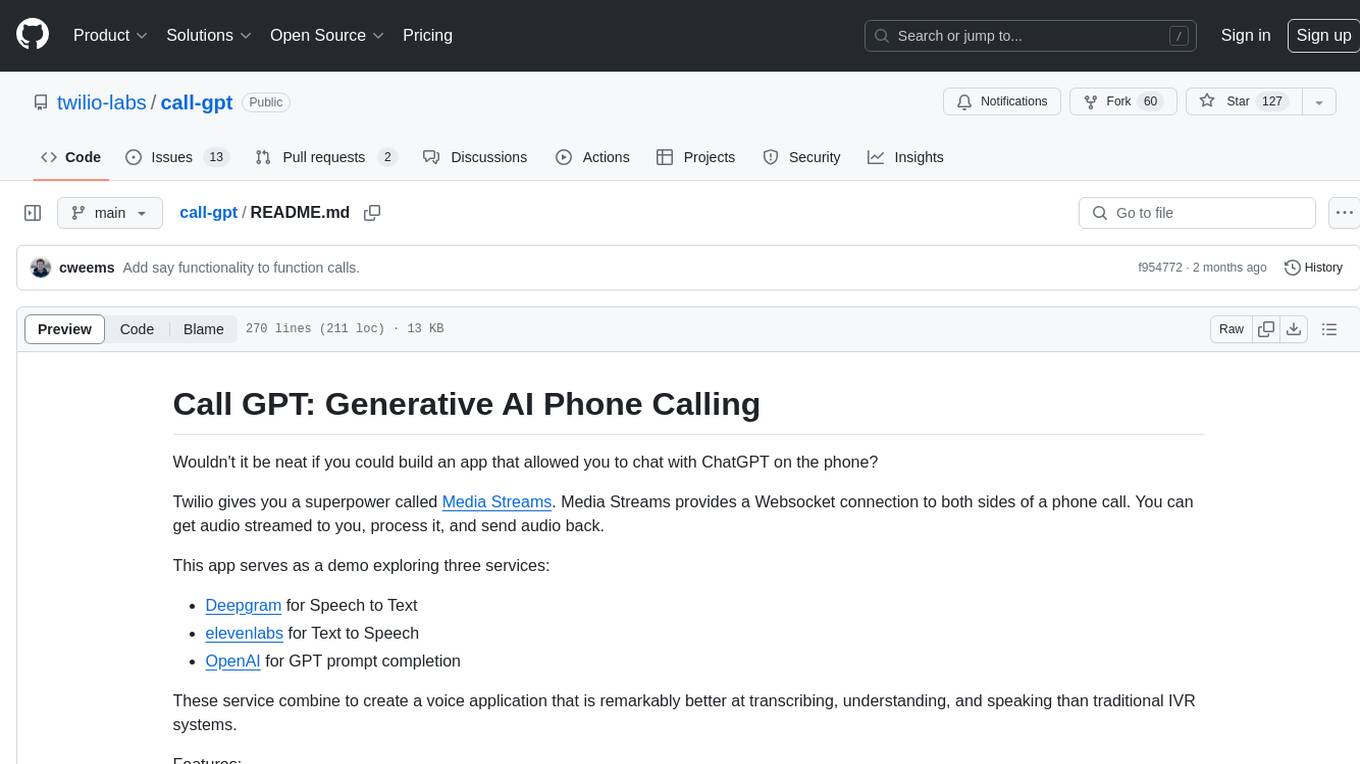
call-gpt
Call GPT is a voice application that utilizes Deepgram for Speech to Text, elevenlabs for Text to Speech, and OpenAI for GPT prompt completion. It allows users to chat with ChatGPT on the phone, providing better transcription, understanding, and speaking capabilities than traditional IVR systems. The app returns responses with low latency, allows user interruptions, maintains chat history, and enables GPT to call external tools. It coordinates data flow between Deepgram, OpenAI, ElevenLabs, and Twilio Media Streams, enhancing voice interactions.
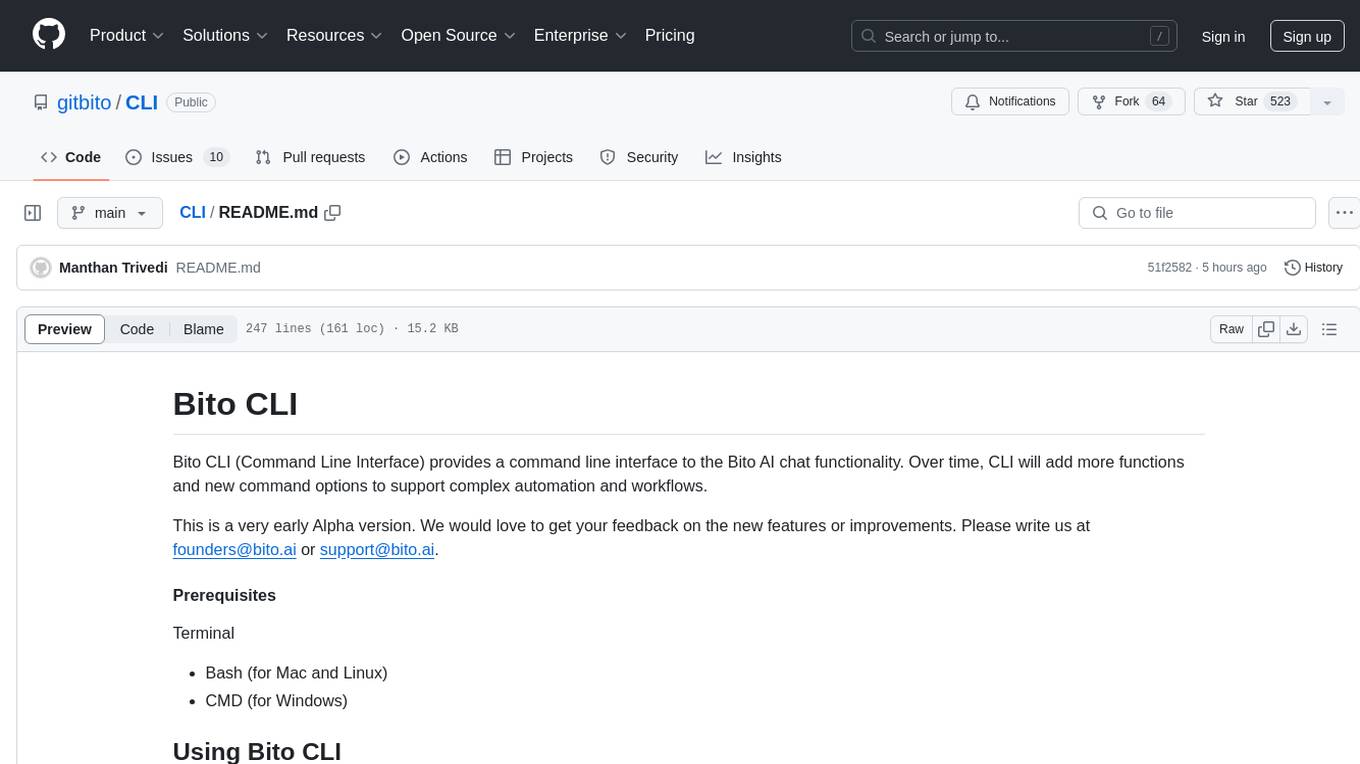
CLI
Bito CLI provides a command line interface to the Bito AI chat functionality, allowing users to interact with the AI through commands. It supports complex automation and workflows, with features like long prompts and slash commands. Users can install Bito CLI on Mac, Linux, and Windows systems using various methods. The tool also offers configuration options for AI model type, access key management, and output language customization. Bito CLI is designed to enhance user experience in querying AI models and automating tasks through the command line interface.

azure-search-openai-javascript
This sample demonstrates a few approaches for creating ChatGPT-like experiences over your own data using the Retrieval Augmented Generation pattern. It uses Azure OpenAI Service to access the ChatGPT model (gpt-35-turbo), and Azure AI Search for data indexing and retrieval.
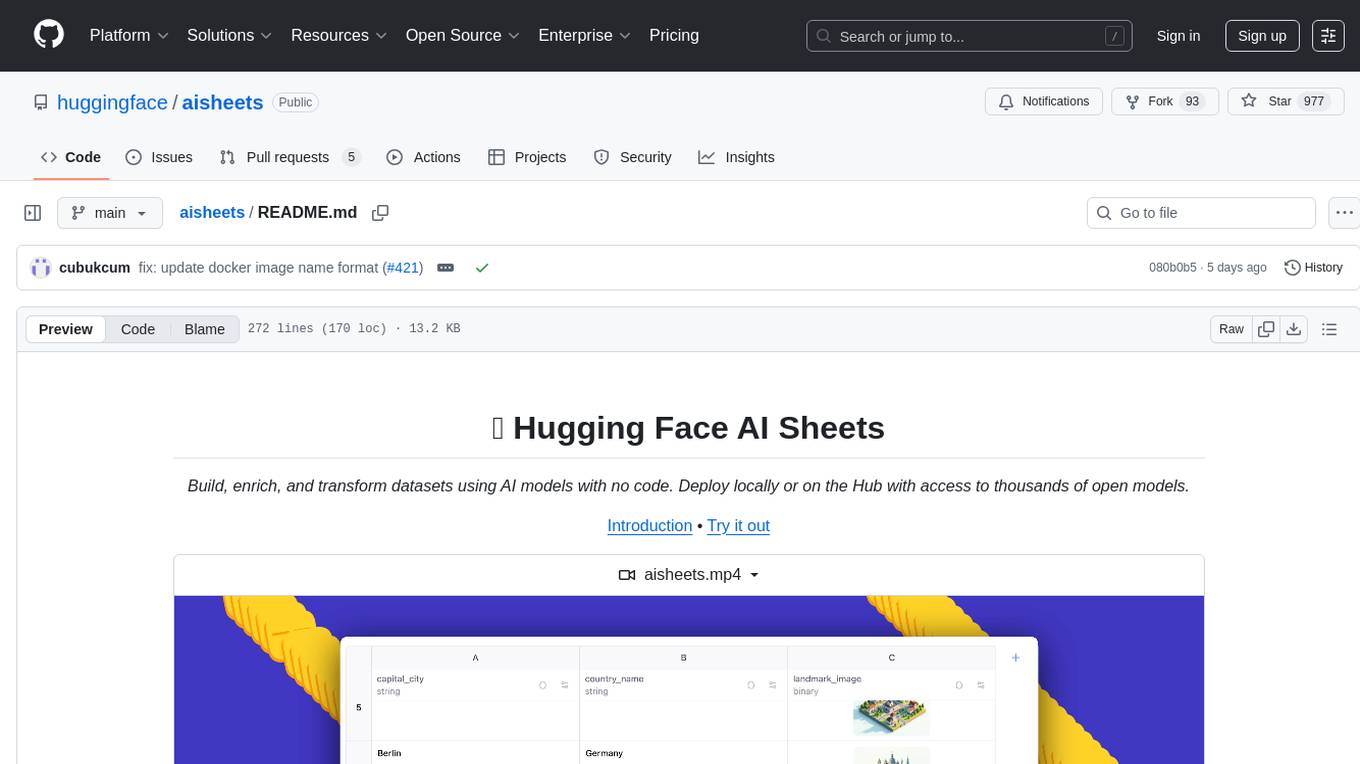
aisheets
Hugging Face AI Sheets is an open-source tool for building, enriching, and transforming datasets using AI models with no code. It can be deployed locally or on the Hub, providing access to thousands of open models. Users can easily generate datasets, run data generation scripts, and customize inference endpoints for text generation. The tool supports custom LLMs and offers advanced configuration options for authentication, inference, and miscellaneous settings. With AI Sheets, users can leverage the power of AI models without writing any code, making dataset management and transformation efficient and accessible.
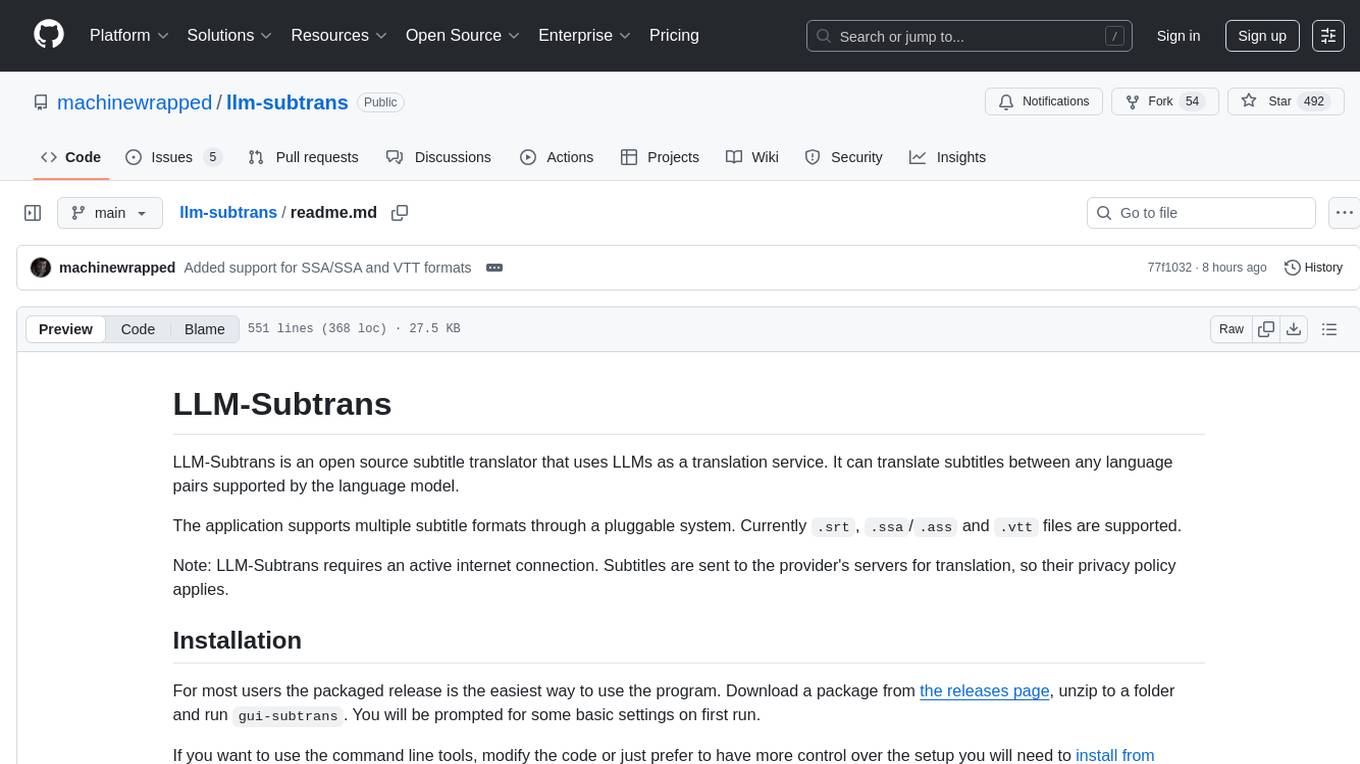
llm-subtrans
LLM-Subtrans is an open source subtitle translator that utilizes LLMs as a translation service. It supports translating subtitles between any language pairs supported by the language model. The application offers multiple subtitle formats support through a pluggable system, including .srt, .ssa/.ass, and .vtt files. Users can choose to use the packaged release for easy usage or install from source for more control over the setup. The tool requires an active internet connection as subtitles are sent to translation service providers' servers for translation.
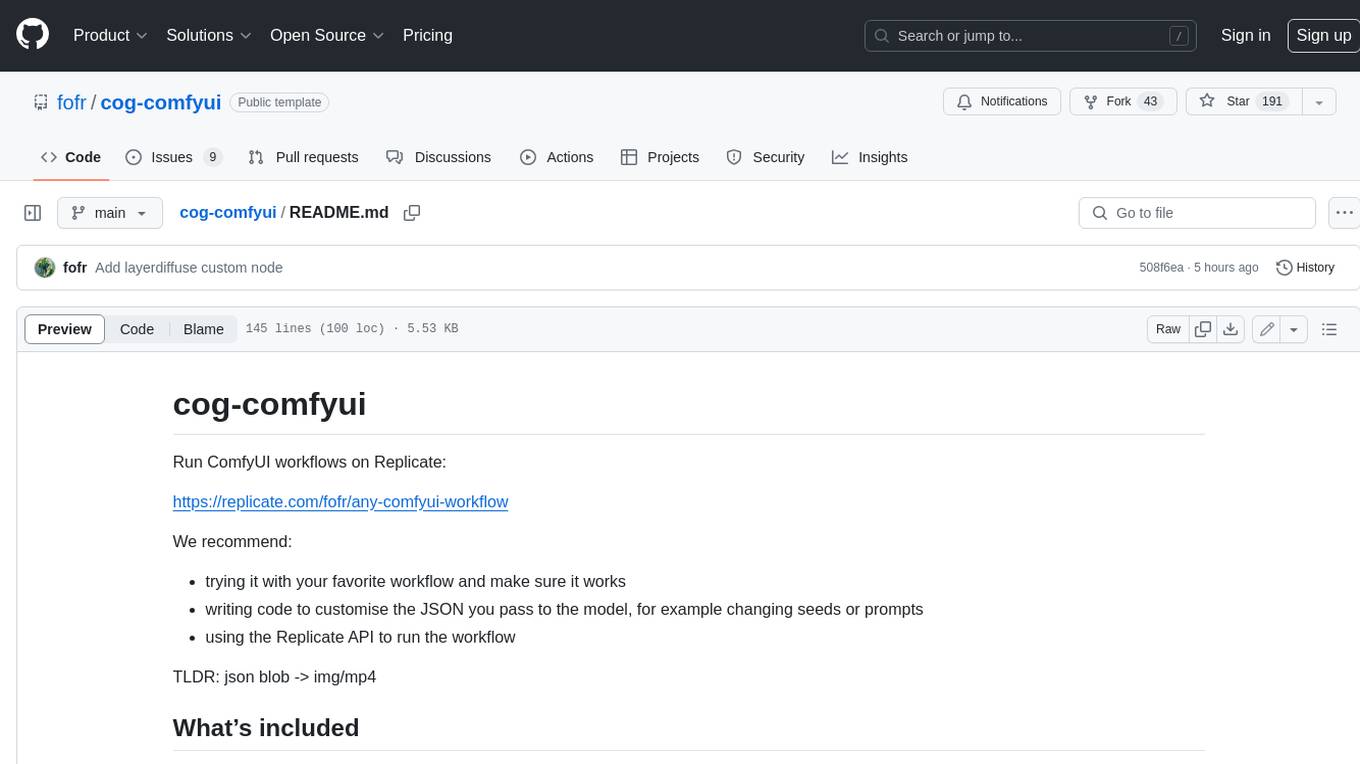
cog-comfyui
Cog-comfyui allows users to run ComfyUI workflows on Replicate. ComfyUI is a visual programming tool for creating and sharing generative art workflows. With cog-comfyui, users can access a variety of pre-trained models and custom nodes to create their own unique artworks. The tool is easy to use and does not require any coding experience. Users simply need to upload their API JSON file and any necessary input files, and then click the "Run" button. Cog-comfyui will then generate the output image or video file.
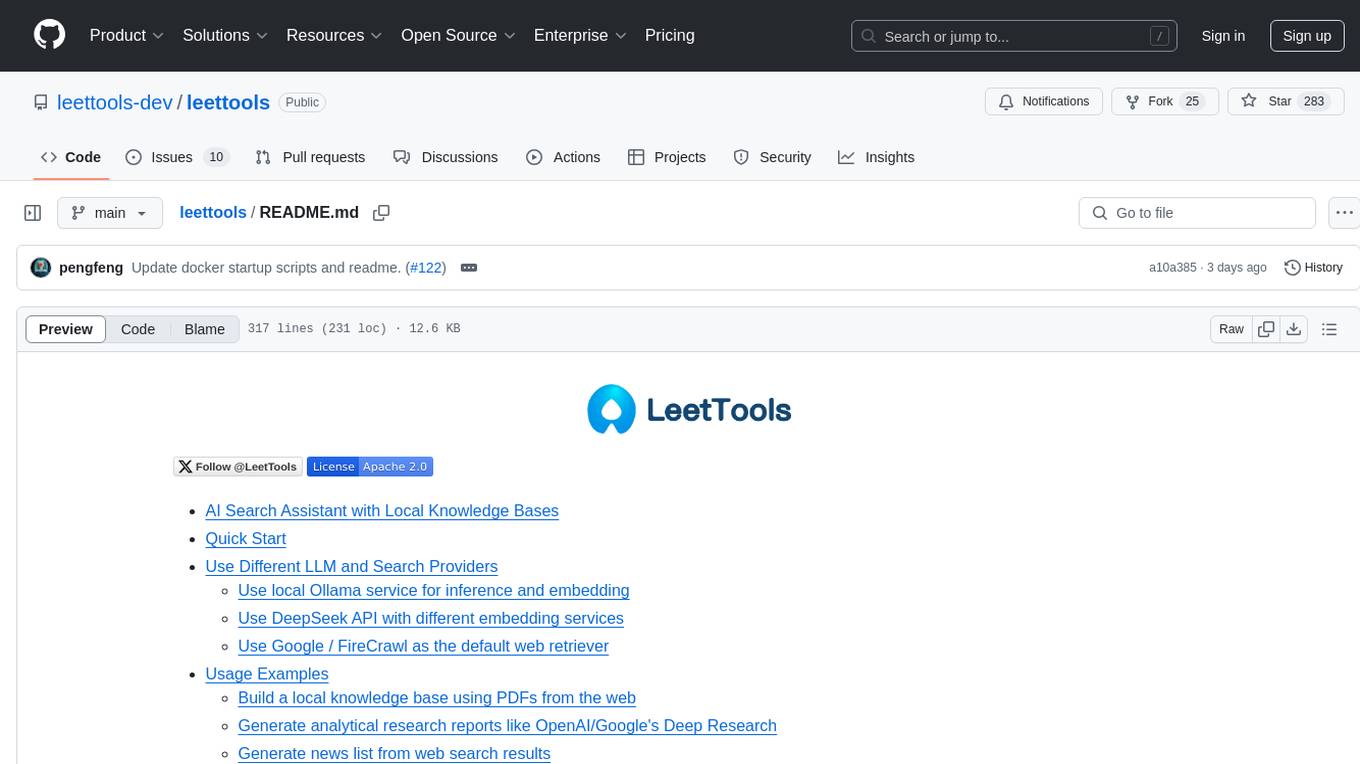
leettools
LeetTools is an AI search assistant that can perform highly customizable search workflows and generate customized format results based on both web and local knowledge bases. It provides an automated document pipeline for data ingestion, indexing, and storage, allowing users to focus on implementing workflows without worrying about infrastructure. LeetTools can run with minimal resource requirements on the command line with configurable LLM settings and supports different databases for various functions. Users can configure different functions in the same workflow to use different LLM providers and models.
For similar tasks

windows9x
Windows9X is an experimental operating system that allows users to generate applications on the fly by entering descriptions of programs. It leverages an LLM to create HTML files resembling Windows 98 applications, with access to a limited OS API for file operations, registry interactions, and LLM prompting.
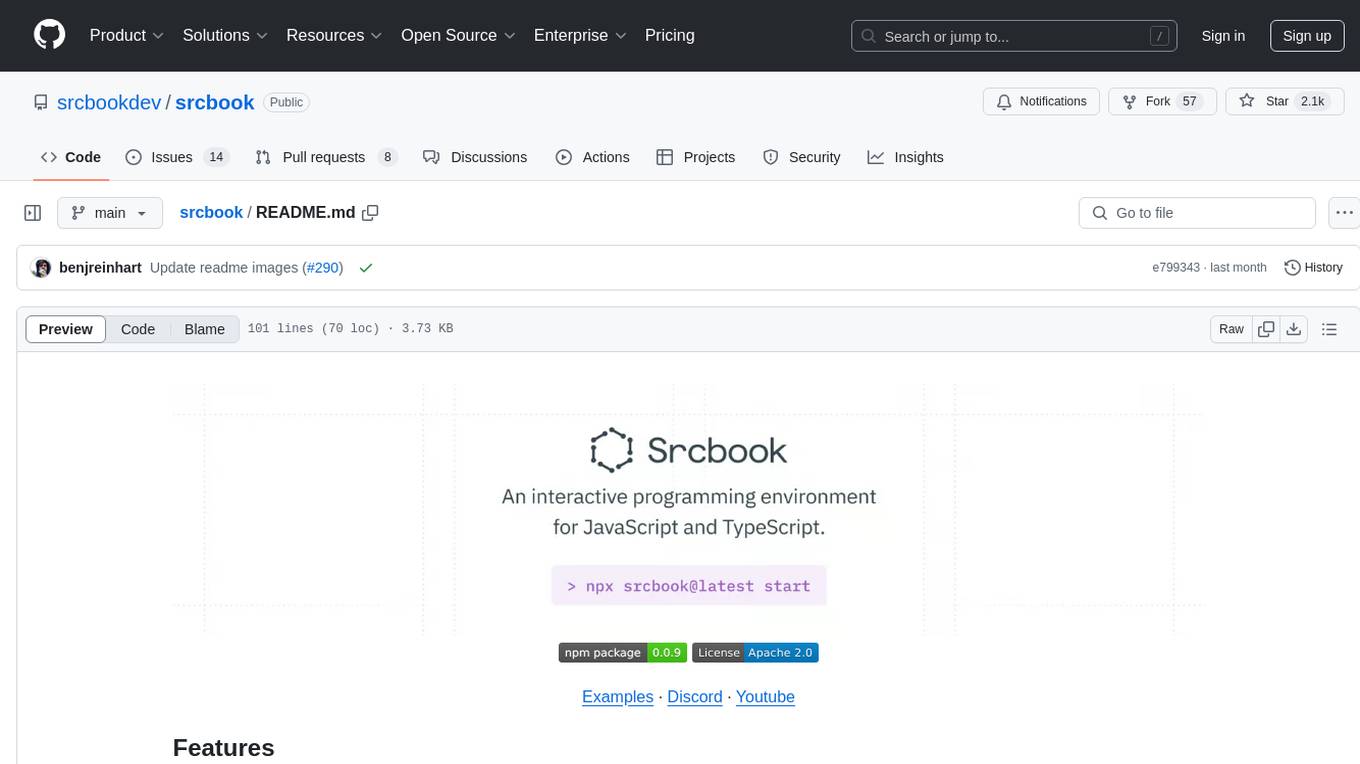
srcbook
Srcbook is an open-source interactive programming environment for TypeScript that allows users to create, run, and share reproducible programs and ideas. It features AI capabilities for exploring and iterating on ideas, supports exporting to valid markdown format, and enables diagraming with mermaid for rich annotations. Users can locally execute programs through a web interface, powered by Node.js under the Apache2 license.
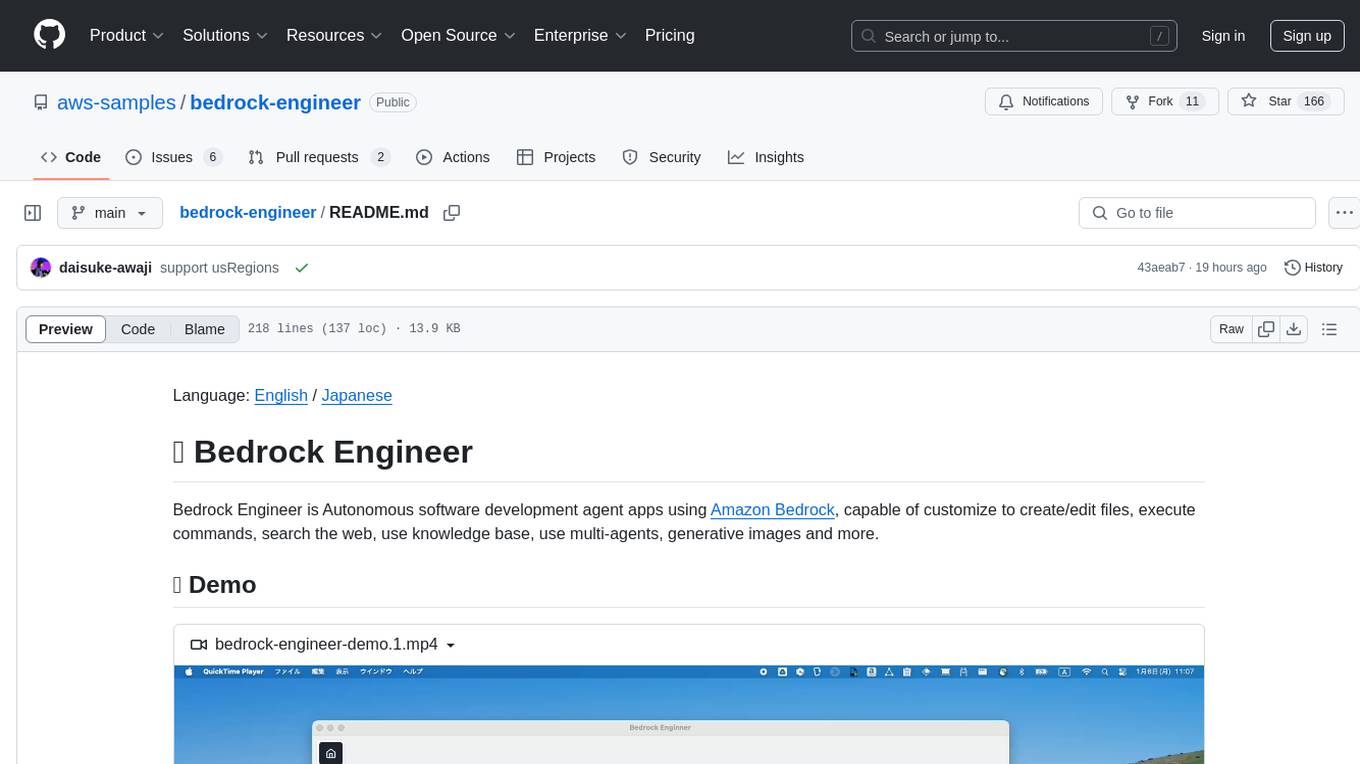
bedrock-engineer
Bedrock Engineer is an autonomous software development agent application that utilizes Amazon Bedrock. It allows users to customize, create/edit files, execute commands, search the web, use a knowledge base, utilize multi-agents, generate images, and more. The tool provides an interactive chat interface with AI agents, file system operations, web search capabilities, project structure management, code analysis, code generation, data analysis, agent and tool customization, chat history management, and multi-language support. Users can select and customize agents, choose from various tools like file system operations, web search, Amazon Bedrock integration, and system command execution. Additionally, the tool offers features for website generation, connecting to design system data sources, AWS Step Functions ASL definition generation, diagram creation using natural language descriptions, and multi-language support.
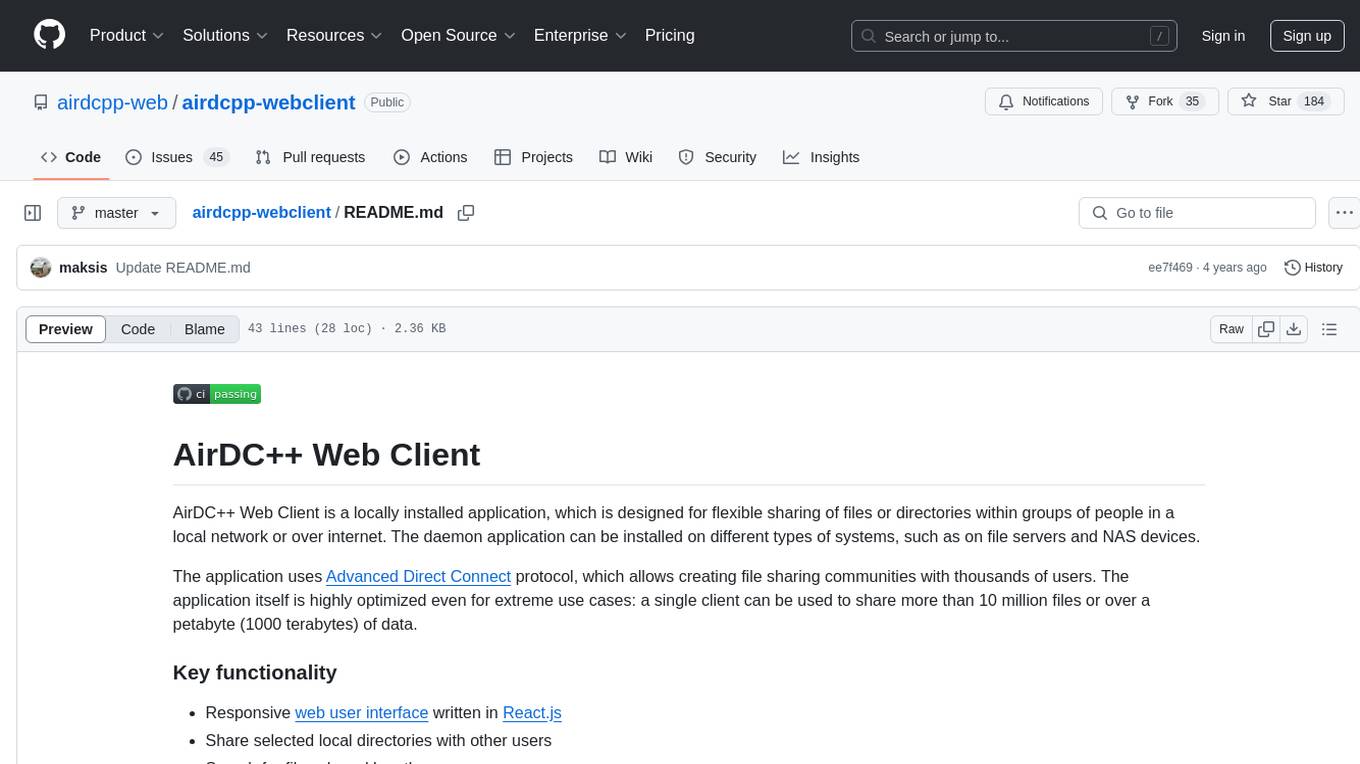
airdcpp-webclient
AirDC++ Web Client is a locally installed application designed for flexible file sharing within groups over a local network or the internet. It utilizes the Advanced Direct Connect protocol to create file sharing communities with thousands of users. The application offers a responsive web user interface, allows sharing local directories, searching for shared files, saving files, chatting capabilities, browsing shared directories, extension support, and a web API for HTTP REST and WebSockets.
For similar jobs

sweep
Sweep is an AI junior developer that turns bugs and feature requests into code changes. It automatically handles developer experience improvements like adding type hints and improving test coverage.

teams-ai
The Teams AI Library is a software development kit (SDK) that helps developers create bots that can interact with Teams and Microsoft 365 applications. It is built on top of the Bot Framework SDK and simplifies the process of developing bots that interact with Teams' artificial intelligence capabilities. The SDK is available for JavaScript/TypeScript, .NET, and Python.

ai-guide
This guide is dedicated to Large Language Models (LLMs) that you can run on your home computer. It assumes your PC is a lower-end, non-gaming setup.

classifai
Supercharge WordPress Content Workflows and Engagement with Artificial Intelligence. Tap into leading cloud-based services like OpenAI, Microsoft Azure AI, Google Gemini and IBM Watson to augment your WordPress-powered websites. Publish content faster while improving SEO performance and increasing audience engagement. ClassifAI integrates Artificial Intelligence and Machine Learning technologies to lighten your workload and eliminate tedious tasks, giving you more time to create original content that matters.

chatbot-ui
Chatbot UI is an open-source AI chat app that allows users to create and deploy their own AI chatbots. It is easy to use and can be customized to fit any need. Chatbot UI is perfect for businesses, developers, and anyone who wants to create a chatbot.

BricksLLM
BricksLLM is a cloud native AI gateway written in Go. Currently, it provides native support for OpenAI, Anthropic, Azure OpenAI and vLLM. BricksLLM aims to provide enterprise level infrastructure that can power any LLM production use cases. Here are some use cases for BricksLLM: * Set LLM usage limits for users on different pricing tiers * Track LLM usage on a per user and per organization basis * Block or redact requests containing PIIs * Improve LLM reliability with failovers, retries and caching * Distribute API keys with rate limits and cost limits for internal development/production use cases * Distribute API keys with rate limits and cost limits for students

uAgents
uAgents is a Python library developed by Fetch.ai that allows for the creation of autonomous AI agents. These agents can perform various tasks on a schedule or take action on various events. uAgents are easy to create and manage, and they are connected to a fast-growing network of other uAgents. They are also secure, with cryptographically secured messages and wallets.

griptape
Griptape is a modular Python framework for building AI-powered applications that securely connect to your enterprise data and APIs. It offers developers the ability to maintain control and flexibility at every step. Griptape's core components include Structures (Agents, Pipelines, and Workflows), Tasks, Tools, Memory (Conversation Memory, Task Memory, and Meta Memory), Drivers (Prompt and Embedding Drivers, Vector Store Drivers, Image Generation Drivers, Image Query Drivers, SQL Drivers, Web Scraper Drivers, and Conversation Memory Drivers), Engines (Query Engines, Extraction Engines, Summary Engines, Image Generation Engines, and Image Query Engines), and additional components (Rulesets, Loaders, Artifacts, Chunkers, and Tokenizers). Griptape enables developers to create AI-powered applications with ease and efficiency.